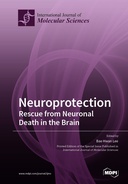Explore

Neuroprotection: Rescue from Neuronal Death in the Brain
0 Ungluers have
Faved this Work
Login to Fave
Dear Colleagues, The brain is vulnerable to injury. Following injury in the brain, apoptosis or necrosis may occur easily, leading to various functional disabilities. Neuronal death is associated with a number of neurological disorders including hypoxic ischemia, epileptic seizures, and neurodegenerative diseases. The brain subjected to injury is regarded to be responsible for the alterations in neurotransmission processes, resulting in functional changes. Oxidative stress produced by reactive oxygen species has been shown to be related to the death of neurons in traumatic injury, stroke, and neurodegenerative diseases. Therefore, scavenging or decreasing free radicals may be crucial for preventing neural tissues from harmful adversities in the brain. Neurotrophic factors, bioactive compounds, dietary nutrients, or cell engineering may ameliorate the pathological processes related to neuronal death or neurodegeneration and appear beneficial for improving neuroprotection. As a result of neuronal death or neuroprotection, the brain undergoes activity-dependent long-lasting changes in synaptic transmission, which is also known as functional plasticity. Neuroprotection implying the rescue from neuronal death is now becoming one of global health concerns. This Special Issue attempts to explore the recent advances in neuroprotection related to the brain. This Special Issue welcomes original research or review papers demonstrating the mechanisms of neuroprotection against brain injury using in vivo or in vitro models of animals as well as in clinical settings. The issues in a paper should be supported by sufficient data or evidence. Prof. Bae Hwan Lee Guest Editor
This book is included in DOAB.
Why read this book? Have your say.
You must be logged in to comment.
Rights Information
Are you the author or publisher of this work? If so, you can claim it as yours by registering as an Unglue.it rights holder.Downloads
This work has been downloaded 105 times via unglue.it ebook links.
- 105 - pdf (CC BY) at Unglue.it.
Keywords
- acid-sensing ion channels
- adenoviral vector
- adiponectin
- Aging
- Alzheimer’s disease
- amiloride
- amyloid-beta
- Amyotrophic lateral sclerosis
- antioxidant
- Antioxidants
- Apoptosis
- ascorbic acid
- Astrocytes
- Astrocytic Networks
- axotomy
- BDNF
- bean phosphatidylserine (Bean-PS)
- Blood Brain Barrier
- Brain
- brain targeting
- Brain-Derived Neurotrophic Factor
- calcium activity
- catecholamines
- cation-chloride cotransporters
- Cell Death
- choline acetyltransferase (ChAT)
- connexin 43
- cortisol
- CRISPR/Cas9
- Depression
- electroneutral transport
- endotheline-1
- excitotoxicity
- GDNF
- gerbil
- glia
- Glioblastoma
- global cerebral ischemia
- GPR4 receptor
- Hippocampus
- homocysteine
- human umbilical cord blood mononuclear cells
- Inflammation
- Insulin
- ischemia
- ischemic stroke
- KCCs
- Lactate
- lipid emulsion
- liver growth factor
- Mek/Erk
- metabolic disease
- Microglia
- middle cerebral artery occlusion
- miRNAs
- moderate hypoxia
- motoneurons
- MPP+
- N-acetyl-l-cysteine
- n/a
- nanoparticle-based drug delivery
- NCAM
- neural injury
- neurodegeneration
- neurodegenerative disease
- neurodegenerative disorder
- Neurogenesis
- Neuronal Death
- Neuroprotection
- nimodipine
- nitrite
- NKCCs
- oculomotor system
- organotypic hippocampal slice culture
- Oxidative Stress
- oxygen-glucose deprivation
- parkinson’s disease
- PGC-1α
- physical exercise
- PI3K/AKT
- preventive gene therapy
- psychomotor function
- pyridoxine deficiency
- reaction time
- Reference, information & interdisciplinary subjects
- reperfusion injury
- Research & information: general
- sodium–hydrogen exchanger-1
- status epilepticus
- Stroke
- subarachnoid haemorrhage
- synaptic plasticity
- Tg2576 transgenic mice
- thema EDItEUR::G Reference, Information and Interdisciplinary subjects::GP Research and information: general
- transient receptor potential melastatin 2
- trimethyltin (TMT)
- trophic factors
- vascular endothelial growth factor
- vascular endothelial growth factor receptor 2
- VEGF
- WNK-SPAK/OSR1
- Zinc
Links
DOI: 10.3390/books978-3-0365-1995-1Editions

